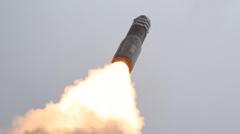The South Korean Defense Ministry indicated that the test aims to enhance the range and altitude of North Korea's missile capabilities. North Korean leader Kim Jong Un described the launch as a demonstration of the country's commitment to counter its adversaries and reaffirmed the nation’s resolve to strengthen its nuclear arsenal. Meanwhile, the United States condemned the launch as a "flagrant violation" of multiple UN Security Council resolutions, emphasizing that North Korea prioritizes its military ambitions over the welfare of its citizens.
In response to the missile test, South Korea plans to impose new sanctions against the North. This test followed a prior ICBM launch in December that traveled for 73 minutes and covered 1,000 km, and it reflects ongoing advancements in North Korea's missile technology aimed at enhancing payload capacity and potential engagement targets, including the United States.
The tensions were further exacerbated by accusations from South Korea and the US regarding North Korean troops allegedly being sent to Russia to aid in the Ukraine conflict. The Pentagon estimates that up to 10,000 North Korean soldiers have been deployed to eastern Russia for training, with unconfirmed numbers reportedly moving westward. This development raises concerns about the ties between North Korea and Russia under the leadership of Kim and Putin.
As countries assess their responses to North Korea’s missile launch, military officials from South Korea and the US convened to strategize possible countermeasures, emphasizing their readiness to handle any threats posed by North Korea's evolving ballistic capabilities.
In response to the missile test, South Korea plans to impose new sanctions against the North. This test followed a prior ICBM launch in December that traveled for 73 minutes and covered 1,000 km, and it reflects ongoing advancements in North Korea's missile technology aimed at enhancing payload capacity and potential engagement targets, including the United States.
The tensions were further exacerbated by accusations from South Korea and the US regarding North Korean troops allegedly being sent to Russia to aid in the Ukraine conflict. The Pentagon estimates that up to 10,000 North Korean soldiers have been deployed to eastern Russia for training, with unconfirmed numbers reportedly moving westward. This development raises concerns about the ties between North Korea and Russia under the leadership of Kim and Putin.
As countries assess their responses to North Korea’s missile launch, military officials from South Korea and the US convened to strategize possible countermeasures, emphasizing their readiness to handle any threats posed by North Korea's evolving ballistic capabilities.



















